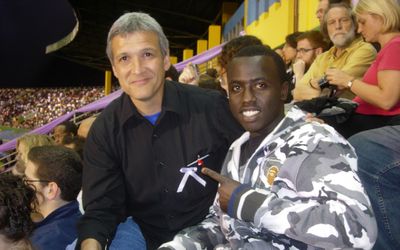Replacing genocide with hope
Witnesses to brutality return to Rwanda for rally

The memories, good and bad, came flooding back to Carl and Teresa Wilkens last week upon their return to Rwanda, a verdant place they once called home before the streets ran red with blood.
It has been 15 years since Hutu turned on Tutsi and the central African nation’s name became a synonym for inhumanity. But the Wilkenses see rebirth in the land where more than 800,000 people were killed within 100 days.
“Rwanda is working to overcome the impossible,” Carl Wilkens said in a phone interview from the capital, Kigali, “to become known not as a nation of genocide, but as a nation of hope, a nation of progress and a nation of integrity.”
Wilkens spoke this week at the commemoration of the genocide in Kigali. He visited the site where the United Nations’ Belgian contingent withdrew, leaving as many as 5,000 people to die in the Nyanza massacre. He saw Rwandans digging in putrid pits to find the remains of loved ones whose bodies where dumped en masse by their killers.
But he also viewed the eternal flame and the oversized words for hope in three languages: French, English and Kinyarwanda. He participated in a commemorative rally of 20,000 people in the Kigali stadium. And on Friday, he was to meet with President Paul Kagame about his work to prevent genocide from occurring again.
The violence began April 7, 1994, the day after the presidents of Rwanda and Burundi were killed in a plane crash. Wilkens was director of the Adventist Development and Relief Agency in Kigali, where he and Teresa had lived for about 10 years. He is the only American known to have remained in Rwanda throughout the period of atrocities.
At the time, his parents, John and Edith Wilkens, of Spokane, were visiting Carl and Teresa and their three children. As the violence escalated, the elder Wilkenses drove Teresa and the children out of the country in a convoy. Carl stayed behind to help those he could.
Among those Wilkens is credited with saving are about 300 children of the Gisimba Orphanage.
When the violence began, he started bringing food and water to the orphanage. One day he arrived with a load of water at the same time as about 50 militiamen who took up positions around the perimeter. Wilkens believed the soldiers had arrived to kill everyone.
Wilkens used his handheld two-way radio to summon help from the gendarmerie. However, the police arrived in numbers inadequate to stave off the militia for long. Wilkens believed he had no choice but to leave the orphanage to find more help.
“I left not knowing whether I would hear gunfire behind me,” Wilkens said.
At the gendarmerie, the commander told him there was no one else to send, so Wilkens went to the office of Tharcisse Renzaho, the governor of the prefecture of Kigali. Renzaho was gone but by coincidence, the new prime minister, Jean Kambanda, was in the building.
“Desperate as I was I stepped in front of him and told him what was going on,” Wilkens recalled. “There was about to be a massacre if it hasn’t happened already. He said it would be taken care of, and it was.”
A few days later Wilkens helped move the orphans to a safer location.
Kambanda was one of the first Rwandan officials to be tried by the International Criminal Tribunal for Rwanda. He is serving a life sentence for genocide and crimes against humanity.
The power of truth and reconciliation is working to a large extent in Rwanda, Wilkens said. He has heard story after story of hope and forgiveness.
The Wilkenses returned to Rwanda in 1995. They continue to fight genocide through their nonprofit educational organization, the World Outside My Shoes. This month they were named Darfur Heroes by the Save Darfur Coalition, an alliance of human rights organizations opposing the ongoing atrocities in Sudan.
In 2005, Carl Wilkens received the Medal of Valor from the Simon Wiesenthal Center, and he was featured in the PBS “Frontline” documentary “Ghosts of Rwanda.”
It is his hope, he said, “that in the storytelling, people will see and connect with the humanity that we all share.”